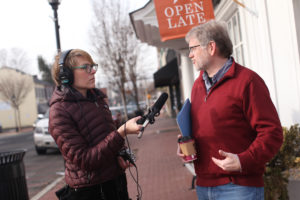As visitors to Southern plantation homes know, the information they receive depends on docents and the questions they’re asked, and by where on the site the group is congregated. In the parlor, for instance, tour-takers might hear about the residents’ family history and the placement of furniture. Outside, they will likely learn more about crops and, perhaps, the lives of enslaved people who labored in the fields.

The process of capturing and interpreting these variations is called “narrative mapping,” said UMW Geography Professor Stephen Hanna, whose research with colleagues at other universities aims to determine – and eventually change – how the South tells its story of slavery.
Hanna and his co-researchers applied the process to 170 tours at 15 different plantation museums. The results from two of those antebellum sites, Louisiana’s Laura Plantation and Virginia’s Berkeley Plantation, formed an article, published in the Journal of Heritage Tourism that won the prestigious Zumkehr Prize for Scholarship in Public Memory.
The honor would not have been possible, Hanna said, without years’ worth of help from Mary Washington students.
“They contributed their ideas, hard work and energy to the project” from 2014 to 2017, said Hanna, who served as the article’s lead author and who, as the team’s only cartographer, designed the method for graphically presenting the results. “My work with the students has become my favorite memories of my time at UMW.”
The students, eight undergrads who are now alumni, helped field test the research method and used it to document tours at 15 plantation museums in Virginia, Louisiana and South Carolina. They also developed ways to interpret and summarize the data collected.
“For a professor to bring undergraduates into their own research is a rare opportunity,” said Christine MacKrell ’17, who helped with the work during her time at Mary Washington.



Called “groundbreaking” and “transformative” by Roger C. Aden, Charles E. Zumkehr professor of communication studies at Ohio University, the research was part of a four-year National Science Foundation (NSF) grant to the seven faculty collaborators. It “provides a lens to explore the manner and extent to which Southern plantations are incorporating the history of slavery, the challenges they face in doing justice to the memories and identities of the enslaved, and how visitors and plantation management and staff interpret and shape the narration of those memories,” according to the Tourism RESET website. Hanna plans to travel to Ohio University at a later date to present the findings.
The prize-winning text was one of more than 20 journal articles and book chapters produced by the team, which also has a book manuscript under review at the University of Georgia Press.
The NSF grant has ended, but Hanna continues to bring students into his research projects – and he continues to focus on the portrayal of African American slaves at historic properties. Last spring, they began to investigate how the relationships between Virginia’s presidential plantation museums – Mount Vernon, Monticello, Montpelier and Highland – and people descended from those once enslaved there impact present-day visitor experiences.
Relieved that the research wrapped up this March, just before social distancing guidelines went into effect, Hanna said, he’s worried about when tours might resume, if sites will be able to reopen at all, and about the future of this type of research.
His efforts, said Provost Nina Mikhalevsky, “truly exemplify our mission – dedicated faculty doing first-rate work, involving and developing our students to do research, and giving them invaluable hands-on experience.”



Congratulations Dr. Hanna and thank you Ms. Billingsley for sharing this story. I’m supervisor of social studies and music at a high school in New Jersey an we’ve had tremendous growth in our Geography program going from zero to four classes in only two years. I have a fantastic young teacher who has just run with the subject and ‘narrative mapping’ is something he’s interested in expanding to our students. Thank you again and well done! Joe D. ’96